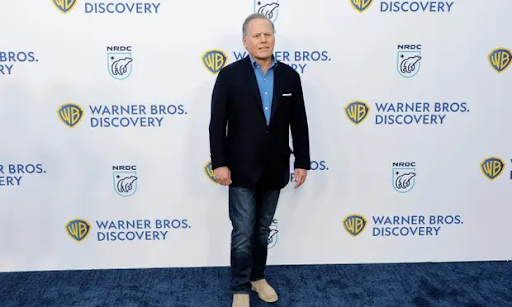Source: The Guardian
In today’s day and age, it’s hardly surprising to hear that a major corporation is being purchased by another, resulting in an even bigger conglomerate that brings the industry as a whole one step closer towards monopoly. That exact situation has played out rather frequently in the film industry in recent years: Disney bought 20th Century Fox in 2019, Viacom and CBS combined to form Paramount Global, and MGM has fallen under the ownership of Amazon. The idea of such buyouts may not be as inherently shocking as they had been in the decades prior, but what isn’t as common is when a major studio is sold to one corporation, only to be immediately resold a short amount of time later. That’s the case with the company previously known as Time Warner Inc., home of the iconic film studio Warner Bros. In 2019, the company was purchased by telecommunications giant AT&T and renamed WarnerMedia, only to be spun off and merged with Discovery, Inc., the television giant behind such networks as Animal Planet and TLC, not too long afterwards in April 2022 and again be renamed to Warner Bros. Discovery. As one might expect, such a drastic change in leadership, especially one that takes place over an alarmingly small amount of time, is guaranteed to have some kind of serious effect on the company, its products, and its employees. That being said, few could have prepared for some of the more recent decisions made by the company, or more specifically CEO David Zaslav, most of which have had people shaking their heads in confusion and frustration.
The first (and possibly most controversial) of these decisions revolves around the DC superhero film “Batgirl”, which was originally expected to premiere on HBO Max, the streaming service owned by Warner Bros. Discovery. Having already finished filming with a budget of around $90 million, one would have expected the film to come out as intended and be accessible to the millions of viewers who subscribed to the platform, especially since it would have been the latest addition to the studio’s long-running and relatively lucrative superhero franchise. However, in a bizarre turn of events, Zaslav recently announced that the film had been canceled entirely (as was another nearly completed project set for an HBO Max release, the animated “Scoob! Holiday Haunt”). The reasoning is supposedly due to the company attempting to move away from exclusive streaming material, but many have cited tax incentives as an additional reason, as it seems Warner Bros. Discovery has opted for a write-down of around $15-20 million rather than accept the potential profits “Batgirl” would’ve generated.
Future projects haven’t been the only films affected though. Shortly after Zaslav’s announcement, HBO Max subscribers began to notice that many of the films that had originally premiered and were exclusively available on the platform had suddenly disappeared. These included “The Witches”, a Robert Zemeckis-directed fantasy starring Anne Hathaway, and “An American Pickle”, a historical comedy-drama starring Seth Rogen. At the moment, the latter is only accessible through iTunes as a $3.99 rental, and many of the other removed titles do not have this luxury. These films were only available to be streamed on HBO Max, so their removal has people worrying about whether or not they are lost forever.
Needless to day, these incidents had stirred a sense of panic among those employed by Warner Bros. Discovery, with worries about further cancellations and layoffs being among the more common concerns. Such concerns were all but confirmed however on Thursday, August 4th, when Zaslav announced at a second-quarter earnings report that HBO Max and Discovery+, the company’s other streaming service, would be merged into one single platform, effectively dropping both of the previous services. This decision has left industry analysts and casual observers baffled, with many citing the use of HBO Max to distribute many of Warner Bros.’ 2021 film releases, including “The Suicide Squad” and “In the Heights”, while they simultaneously screened in theaters. On the other hand, others have pointed out that making these films available in theaters and on HBO Max at the same time has resulted in them being commercial disappointments, as was the case for such films as “Space Jam: A New Legacy” and “The Matrix Resurrections”. This may have been what was on Zaslav’s mind when he announced a “comeback” of only-in-theaters releasing. “We will fully embrace theatrical,” he announced, a sentiment that may come as a relief for those determined to preserve the longevity of the theatrical experience.
One announcement that did not come as a relief, however, was how Zaslav and Warner Bros. Discovery viewed the demographics of their streaming services, resulting in quick backlash on social media as well as a handful of mocking memes. According to Zaslav, HBO Max is “male skew”, “lean in” and “home of fandoms”, while Discovery+ is “female skew”, “lean back” and “home of genredoms”. Such descriptions were immediately met with accusations of sexism, as many ridiculed such notions as HBO Max was only for men who liked comic book movies, or Discovery+ was only for women who liked reality television (in theory, both platforms would be most profitable if they attempted to cater to as many demographics as possible).
Also becoming the recipient of mockery online was another part of Zaslav’s presentation that showed the “plan” Warner Bros. Discovery would pursue in its most basic form, represented by the images of a circle labeled “Content” from which arrows pointed to a large block that read “Streaming” in large text and “Movies” and “TV” in smaller text. The vagueness of such a diagram may be easy to poke fun at, but for many, it’s a painful reminder of how corporations view the art of film not as the product of passion and hard work, but rather a means of pushing for further economic gain. Few would be able to find reasons for Warner Bros. Discovery’s recent decisions that aren’t motivated by finances, and should the company continue to follow this path, the artistic integrity of its media catalog could be further jeopardized.




